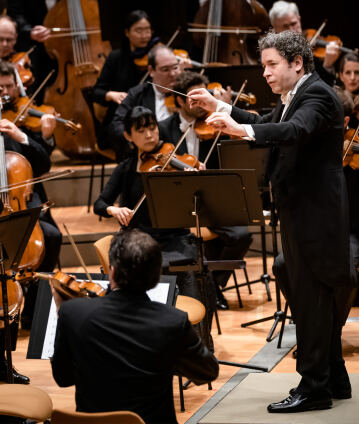Gustavo Dudamel conducts Mahler’s Second Symphony

“Why have you lived? Why have you suffered?” These are the fundamental questions that Gustav Mahler deals with in his Second Symphony. Dark humour and yearning solos are also to be found in the work’s formidable spectrum of expression. The Berliner Philharmoniker, conductor Gustavo Dudamel, the Rundfunkchor Berlin and all the performers dedicated this performance of the “Resurrection Symphony” to the people affected by the Russian attacks on Ukraine.
Gustavo Dudamel’s passion for the music of Gustav Mahler has undoubtedly given rise to many great moments. After the composer’s First, Third and Fifth Symphonies, which the conductor has performed with the Berliner Philharmoniker since 2014, this concert now features the Second.
While Mahler had adhered to the traditional four-movement and purely instrumental scoring of the Classical-Romantic model in his First Symphony, he broke completely new ground with his five-movement Second. The use of the chorus in the finale naturally draws on the model of Beethoven’s Ninth, but the integration of a song – Mahler used Urlicht, originally written for the Wunderhorn collection, as the fourth movement – represents a novelty in the history of the genre. The symphony’s depth of expression, dramaturgical arc and spiritual aspiration, which finds its goal in the Klopstock setting of the Resurrection finale, elevate it to a central work of early Modernism. The piece is of special significance to the Berliner Philharmoniker, not least because they premiered it in 1895 under the direction of the composer himself.
While the young singer Nadine Sierra, who has been acclaimed at La Scala in Milan and the Staatsoper in Berlin, among others, makes her Philharmoniker debut in this performance, mezzo-soprano Okka von der Damerau enchanted the Philharmonic audience most recently in Mahler’s Third Symphony.
© 2022 Berlin Phil Media GmbH
Related interviews
Artists
Our recommendations
- Christian Thielemann conducts Brahms’s “Deutsches Requiem”
- Simon Rattle conducts Beethoven and Mendelssohn at the Waldbühne
- Kirill Petrenko conducts Mendelssohn’s “Elijah”
- Kirill Petrenko conducts Schoenberg
- Simon Rattle conducts Stravinsky and Berio
- Sir Simon Rattle conducts Britten’s “War Requiem”